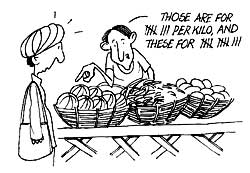Money for nothing?
Money for nothing?

imagine this terrifying scenario - the industrial town of Jamshedpur, which is home to Tata Iron and Steel Co Ltd, India's pioneering steel plant, suddenly goes bankrupt and declares a lockout. Because, a more efficient South Korean company based in Vijaywada has forced the inefficient Tata management out of the market. Not an unexpected prospect in a global economy, but now, unemployment and poverty and desolation are writ large on the faces of the local workers and their families. Money to grease the local economy is in short supply. What does the future hold? Will it mean the end of their livelihoods?
The local barber cannot find clients, nor can the local shopkeeper sell his stock of eggs. In a globalised economy which will increase competetion, such situations can increase. Competetions can force companies to close down or they can themselves relocate to take competetive advantage.In both cases, the local community will find its economy shattered because there will be loss of jobs and hence, shortage of liquid cash to keep local economic transactions going.
A similar situation occurred recently in the Comox Valley area of British Columbia, western Canada. But the region's people, instead of losing all hope, devised an innovative form of community-based trade known as the lets ystem, which does away with the concept of money. The name lets ystem was culled from the first person English word 'Lets', implying a collective effort by people.
The simple innovation was to keep local production and skills in operation by creating a community register of economic transactions in which each member of the community has an account. Ram can then ask the local cowherd, Krishna, to give him five points worth of milk. The register will record the transaction by crediting five points to Krishna and debiting five to Ram. Ram, in turn, a good teacher, can give tuitions to the son of the local grocer, Samar, and charge 20 points. The register will reflect this transaction, too. Krishna, meanwhile, with the five points he had earned from Ram, can go to Rahul, the barber for a haircut. In this manner, local economic activity goes on without the need for money from the government mint - one human need is traded for another one to keep the local economy going.
The small town's example has paved the path for a parallel economy to flourish within the realm of international finance; and the beneficiaries are not big multinationals or businesses, but people from remote and diverse parts of the world. Observes Michael Linton who designed the letsystem, "When the local economy (of Comox Valley) dried out, we saw that real goods and services were still available and the needs still present. We sought to coordinate this through devising a barter exchange - list of offers and requests - with the initial idea of direct exchange







